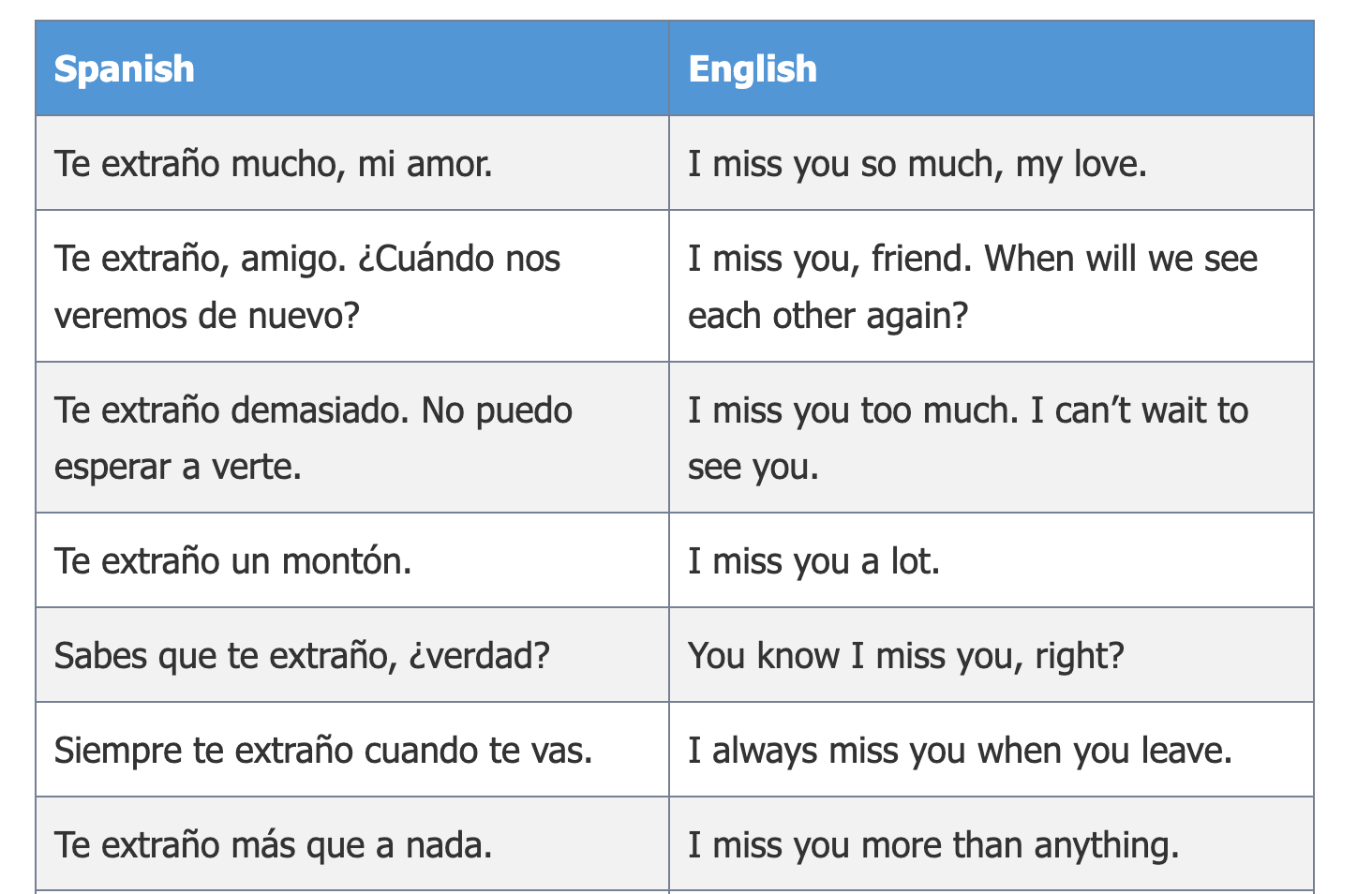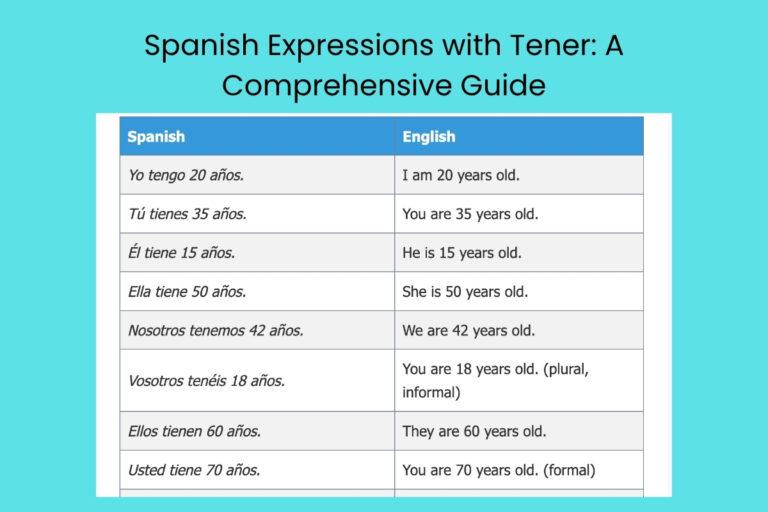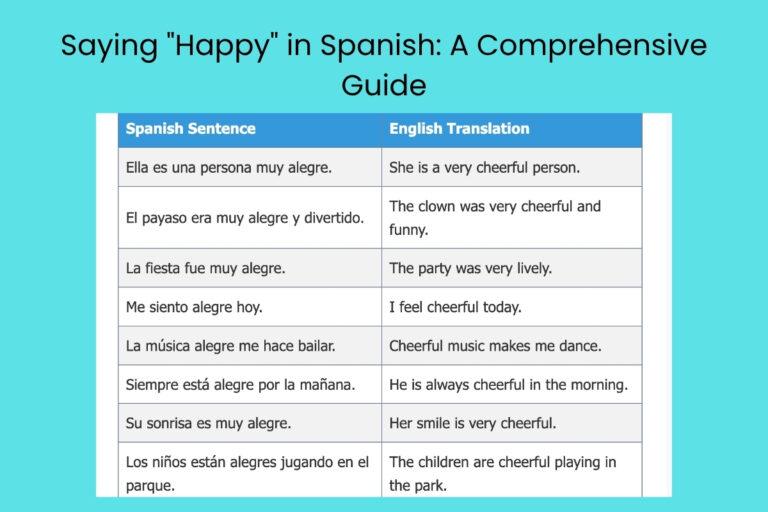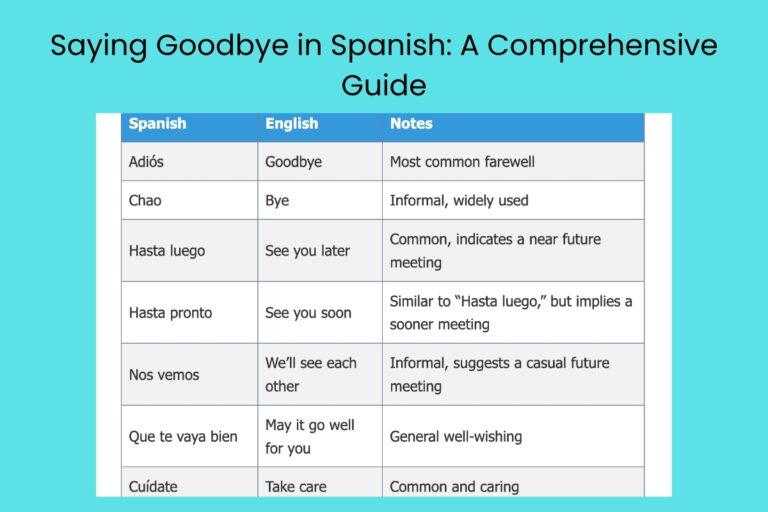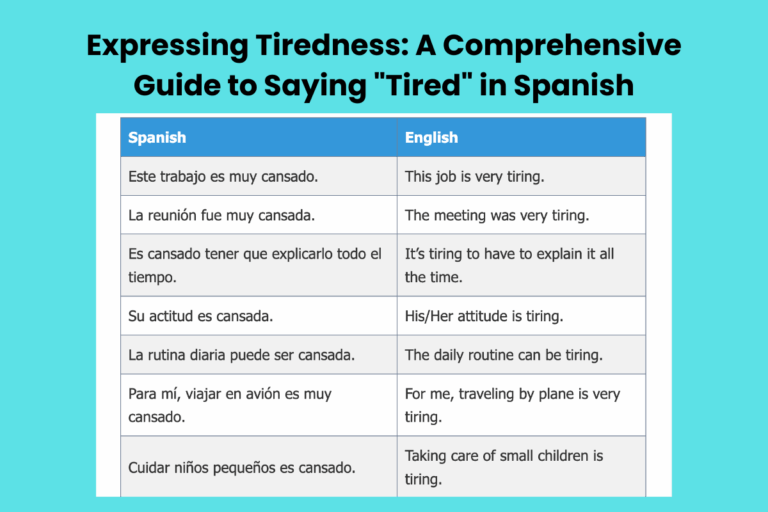Expressing Affection: How to Say “I Miss You” in Spanish
Expressing emotions across different languages can be both enriching and challenging. Saying “I miss you” is a fundamental expression of affection and longing, and knowing how to convey this sentiment in Spanish is crucial for building meaningful connections with Spanish speakers.
This article provides a comprehensive guide to mastering the various ways to say “I miss you” in Spanish, covering grammatical nuances, regional variations, and practical usage tips. Whether you’re a beginner or an advanced learner, this guide will equip you with the knowledge and confidence to express your feelings accurately and authentically.
Understanding these expressions allows for deeper communication and connection with loved ones, friends, and acquaintances in Spanish-speaking cultures. This article will benefit language learners, travelers, and anyone seeking to enhance their Spanish communication skills.
Table of Contents
- Introduction
- Definition: “I Miss You” in Spanish
- Structural Breakdown of ‘Te Extraño’
- Types and Categories of Expressions
- Examples of Usage
- Usage Rules and Guidelines
- Common Mistakes to Avoid
- Practice Exercises
- Advanced Topics
- Frequently Asked Questions (FAQ)
- Conclusion
Definition: “I Miss You” in Spanish
The most common way to say “I miss you” in Spanish is “Te extraño.” This phrase is widely understood and used across most Spanish-speaking countries. The verb “extrañar” means “to miss,” and the pronoun “te” means “you.” Therefore, “Te extraño” literally translates to “I miss you (informal).” The phrase encapsulates a feeling of longing or absence of someone or something. It’s a versatile expression suitable for various contexts, from casual conversations to heartfelt expressions of affection.
Besides “Te extraño,” there are other ways to express the sentiment of missing someone, each with its own nuance and level of formality. One such expression is “Me haces falta,” which translates more closely to “You are lacking to me” or “I need you.” While “Te extraño” focuses on the feeling of missing someone, “Me haces falta” emphasizes the need or lack caused by their absence. Both expressions are valid ways to convey the feeling of missing someone, and the choice between them often depends on personal preference and the specific context. Understanding these nuances allows for more precise and meaningful communication in Spanish.
Additionally, it’s essential to consider the formality of the situation. While “Te extraño” is generally used in informal settings, there are more formal ways to express missing someone, such as using the formal “usted” form.
These variations will be explored in detail in subsequent sections.
Structural Breakdown of ‘Te Extraño’
The phrase “Te extraño” is composed of two key elements: the pronoun and the verb. Understanding the function of each element is crucial for mastering the expression and adapting it to different contexts.
Pronoun: “Te” is the informal singular direct object pronoun meaning “you.” In this context, it indicates the person who is being missed. The pronoun precedes the verb in Spanish, which is a common word order for pronouns in many sentence structures.
Verb: “Extraño” is the first-person singular present tense conjugation of the verb “extrañar,” which means “to miss.” The conjugation indicates that the speaker is the one experiencing the feeling of missing someone.
Therefore, the structure of “Te extraño” follows the pattern: (Direct Object Pronoun) + (Verb Conjugated in First-Person Singular Present Tense). This structure can be modified to express missing someone in different tenses or to refer to missing different people, as we will see in the following sections.
Types and Categories of Expressions
There are several ways to express “I miss you” in Spanish, each tailored to different people, situations, and levels of formality. Here’s a breakdown of the most common expressions:
“Te Extraño”
As mentioned earlier, “Te extraño” is the most common and widely used expression. It’s suitable for informal situations and is generally used when speaking to friends, family members, or romantic partners. It directly translates to “I miss you” and is a straightforward way to convey your feelings.
“Le Extraño” / “La Extraño”
The expressions “Le extraño” and “La extraño” are used in more formal contexts. “Le extraño” is used when addressing a male person formally, while “La extraño” is used when addressing a female person formally. The pronoun “le” or “la” replaces “te” to denote the formal “you” (usted). This is crucial in showing respect and maintaining proper etiquette in formal settings.
“Los Extraño” / “Las Extraño”
When missing a group of people, the expressions “Los extraño” and “Las extraño” are used. “Los extraño” is used when referring to a group of males or a mixed-gender group, while “Las extraño” is used when referring to a group of females. The pronouns “los” and “las” are the plural direct object pronouns corresponding to “them.”
“Me Haces Falta”
The phrase “Me haces falta” conveys a slightly different nuance than “Te extraño.” While “Te extraño” focuses on the feeling of missing someone, “Me haces falta” emphasizes the need for that person. It translates to “You are lacking to me” or “I need you.” This expression is often used to express a deeper sense of longing or dependence.
Other Expressions
Besides the common expressions mentioned above, there are other ways to convey the sentiment of missing someone in Spanish. These expressions often add emphasis or convey a specific emotion. For example, you could say “Siento tu falta” (I feel your absence) or “No puedo vivir sin ti” (I can’t live without you) to express a more profound sense of longing. These expressions are often used in romantic contexts or to express deep affection.
Examples of Usage
To fully grasp how to use these expressions, let’s look at specific examples in different contexts:
Examples of “Te Extraño”
The following table provides examples of how to use “Te extraño” in various informal contexts. Notice how the phrase is often accompanied by other expressions of affection or longing.
Table 1: Examples of “Te Extraño” in Informal Contexts
| Spanish | English |
|---|---|
| Te extraño mucho, mi amor. | I miss you so much, my love. |
| Te extraño, amigo. ¿Cuándo nos veremos de nuevo? | I miss you, friend. When will we see each other again? |
| Te extraño demasiado. No puedo esperar a verte. | I miss you too much. I can’t wait to see you. |
| Te extraño un montón. | I miss you a lot. |
| Sabes que te extraño, ¿verdad? | You know I miss you, right? |
| Siempre te extraño cuando te vas. | I always miss you when you leave. |
| Te extraño más que a nada. | I miss you more than anything. |
| Te extraño cada día. | I miss you every day. |
| Te extraño en cada momento. | I miss you in every moment. |
| Te extraño terriblemente. | I miss you terribly. |
| Te extraño, mamá. | I miss you, Mom. |
| Te extraño, papá. | I miss you, Dad. |
| Te extraño, hermana. | I miss you, sister. |
| Te extraño, hermano. | I miss you, brother. |
| Te extraño, abuela. | I miss you, Grandma. |
| Te extraño, abuelo. | I miss you, Grandpa. |
| Te extraño, cariño. | I miss you, darling. |
| Te extraño, mi vida. | I miss you, my life. |
| Te extraño, corazón. | I miss you, sweetheart. |
| Te extraño, cielo. | I miss you, honey. |
| Te extraño mucho, ¿cuándo vuelves? | I miss you a lot, when are you coming back? |
| No sabes cuánto te extraño. | You don’t know how much I miss you. |
| Te extraño como nunca antes. | I miss you like never before. |
Examples of “Le Extraño/La Extraño”
The following table contains examples of how to use “Le extraño” and “La extraño” in formal settings. Note the use of “Señor” or “Señora” to address the person formally.
Table 2: Examples of “Le Extraño/La Extraño” in Formal Contexts
| Spanish | English |
|---|---|
| Le extraño, Señor Gómez. Espero que se encuentre bien. | I miss you, Mr. Gómez. I hope you are doing well. |
| La extraño, Señora Rodríguez. Ha sido un placer conocerla. | I miss you, Mrs. Rodríguez. It has been a pleasure meeting you. |
| Le extraño mucho, Profesor. | I miss you a lot, Professor. |
| La extraño mucho, Profesora. | I miss you a lot, Professor. |
| Le extraño, Señor Director. | I miss you, Mr. Director. |
| La extraño, Señora Directora. | I miss you, Mrs. Director. |
| Le extraño, Señor Alcalde. | I miss you, Mr. Mayor. |
| La extraño, Señora Alcaldesa. | I miss you, Mrs. Mayor. |
| Le extraño, Señor Presidente. | I miss you, Mr. President. |
| La extraño, Señora Presidenta. | I miss you, Mrs. President. |
| Le extraño, Señor Juez. | I miss you, Mr. Judge. |
| La extraño, Señora Jueza. | I miss you, Mrs. Judge. |
| Le extraño, Señor Abogado. | I miss you, Mr. Lawyer. |
| La extraño, Señora Abogada. | I miss you, Mrs. Lawyer. |
Examples of “Los Extraño/Las Extraño”
When missing a group of people, use “Los extraño” or “Las extraño.” The following table illustrates their usage.
Table 3: Examples of “Los Extraño/Las Extraño”
| Spanish | English |
|---|---|
| Los extraño, chicos. ¡Espero verlos pronto! | I miss you guys. I hope to see you soon! |
| Las extraño, chicas. ¡Reunámonos pronto! | I miss you girls. Let’s get together soon! |
| Los extraño a todos. | I miss you all. |
| Las extraño a todas. | I miss you all. (female group) |
| Los extraño, mis amigos. | I miss you, my friends. |
| Las extraño, mis amigas. | I miss you, my female friends. |
| Los extraño mucho, equipo. | I miss you a lot, team. |
| Los extraño, compañeros. | I miss you, colleagues. |
| Las extraño, compañeras. | I miss you, female colleagues. |
| Los extraño, vecinos. | I miss you, neighbors. |
| Las extraño, vecinas. | I miss you, female neighbors. |
| Los extraño, hijos. | I miss you, sons. |
| Las extraño, hijas. | I miss you, daughters. |
| Los extraño, nietos. | I miss you, grandsons. |
| Las extraño, nietas. | I miss you, granddaughters. |
Examples of “Me Haces Falta”
“Me haces falta” emphasizes the need for someone. Here are some examples:
Table 4: Examples of “Me Haces Falta”
| Spanish | English |
|---|---|
| Me haces mucha falta, mi amor. | I need you so much, my love. |
| Me haces falta en mi vida. | I need you in my life. |
| Me haces falta cuando estoy solo. | I need you when I’m alone. |
| Me haces falta más de lo que imaginas. | I need you more than you imagine. |
| Me haces falta cada día que pasa. | I need you with each passing day. |
| Me haces tanta falta. | I need you so much. |
| Me haces falta aquí. | I need you here. |
| Me haces falta siempre. | I always need you. |
| Me haces falta en este momento. | I need you at this moment. |
| Me haces falta, papá. | I need you, Dad. |
| Me haces falta, mamá. | I need you, Mom. |
| Me haces falta, abuelo. | I need you, Grandpa. |
| Me haces falta, abuela. | I need you, Grandma. |
| Me haces falta, hermano. | I need you, brother. |
| Me haces falta, hermana. | I need you, sister. |
Usage Rules and Guidelines
Proper usage of these expressions involves understanding pronoun placement, formality levels, and regional variations.
Pronoun Placement
In Spanish, direct object pronouns like “te,” “le,” “la,” “los,” and “las” typically precede the verb. However, when the verb is in the infinitive or gerund form, the pronoun can be attached to the end of the verb. For example, instead of saying “Te quiero ver,” you can say “Quiero verte.” This rule applies to “extrañar” as well, but it’s less common in everyday speech.
Formal vs. Informal
Choosing between “Te extraño” and “Le/La extraño” depends on the level of formality required. Use “Te extraño” with friends, family, and people you know well.
Use “Le extraño” (for males) or “La extraño” (for females) when addressing someone formally, such as a superior, an elderly person, or someone you’ve just met.
Regional Variations
While “Te extraño” is widely understood, some regions may prefer other expressions. For example, in some Latin American countries, “Me haces falta” might be more commonly used than “Te extraño.” Familiarizing yourself with regional preferences can help you communicate more effectively and naturally.
Common Mistakes to Avoid
Several common mistakes can occur when using these expressions. Here are a few to watch out for:
Incorrect: Yo te extraño. Correct: Te extraño. (The pronoun “yo” is usually omitted because the verb conjugation already indicates who is speaking.)
Incorrect: Te extraño mucho, Señor. Correct: Le extraño mucho, Señor. (“Te” is informal; use “Le” for formal address.)
Incorrect: Me hago falta. Correct: Me haces falta. (The verb “hacer” needs to be conjugated correctly to agree with the person being missed.)
Incorrect: Extraño a ti. Correct: Te extraño. (The personal “a” is not needed before the pronoun in this construction.)
Incorrect: *Extraño tu.* Correct: *Te extraño.* (The word order is incorrect. The pronoun comes before the verb.)
Practice Exercises
Test your understanding with these practice exercises:
Exercise 1: Fill in the Blank
Fill in the blank with the appropriate expression:
Table 5: Practice Exercise 1
| Question | Answer |
|---|---|
| 1. Amigo, te ____________ mucho. | extraño |
| 2. Señora, la ____________ mucho. | extraño |
| 3. Me ____________ falta en mi vida. | haces |
| 4. Chicos, los ____________ a todos. | extraño |
| 5. Papá, te ____________ mucho. | extraño |
| 6. Profesora, la ____________ mucho. | extraño |
| 7. Hermanas, las ____________ mucho. | extraño |
| 8. Amada, me ____________ mucha falta. | haces |
| 9. Presidente, le ____________ mucho. | extraño |
| 10. Hijos, los ____________ mucho. | extraño |
Exercise 2: Translation
Translate the following sentences into Spanish:
Table 6: Practice Exercise 2
| Question | Answer |
|---|---|
| 1. I miss you, my friend. | Te extraño, mi amigo. |
| 2. I miss you a lot, Mrs. Smith. | La extraño mucho, Señora Smith. |
| 3. I need you in my life. | Me haces falta en mi vida. |
| 4. I miss you all, my students. | Los extraño a todos, mis estudiantes. |
| 5. I miss you so much, my love. | Te extraño mucho, mi amor. |
| 6. I miss you, Grandma. | Te extraño, abuela. |
| 7. I need you, Dad. | Me haces falta, papá. |
| 8. I miss you, girls! | Las extraño, chicas! |
| 9. I miss you, Mr. President. | Le extraño, Señor Presidente. |
| 10. I miss you every day. | Te extraño cada día. |
Advanced Topics
For advanced learners, let’s explore more complex aspects of expressing missing someone in Spanish.
Subjunctive Mood in Missing Someone
The subjunctive mood can be used to express doubt, desire, or emotion related to missing someone. For example, you might say “Espero que no me extrañes demasiado” (I hope you don’t miss me too much). The subjunctive is used here because it expresses a hope or desire, which is subjective. The use of the subjunctive adds a layer of complexity and nuance to your expressions.
Another example is using the subjunctive in sentences that express doubt or uncertainty about whether someone misses you. For instance, “Dudo que me extrañe” (I doubt that he/she misses me). Here, the subjunctive ‘extrañe’ is used because the sentence expresses doubt.
Poetic and Literary Expressions
In literature and poetry, there are countless ways to express the feeling of missing someone using vivid imagery and figurative language. Phrases like “Mi alma te anhela” (My soul yearns for you) or “Tu ausencia es un invierno en mi corazón” (Your absence is a winter in my heart) are examples of poetic expressions that convey a deep sense of longing. These expressions often use metaphors and similes to create a powerful emotional impact.
Another example of a poetic expression is, “Cada latido de mi corazón te nombra” (Every beat of my heart names you). This phrase uses the metaphor of a heartbeat to express constant remembrance and longing.
These types of expressions are common in love songs and romantic poetry.
Frequently Asked Questions (FAQ)
Here are some frequently asked questions about expressing “I miss you” in Spanish:
Q1: Is “Te extraño” always informal?
A: Yes, “Te extraño” is generally considered informal. For formal situations, use “Le extraño” (to a man) or “La extraño” (to a woman).
Q2: Can I use “Me haces falta” in all situations?
A: While “Me haces falta” is widely understood, it emphasizes the need for someone rather than simply missing them. Choose the expression that best conveys your intended meaning.
Q3: What’s the difference between “Extrañar” and “Echar de menos”?
A: “Extrañar” is more common in Latin America, while “Echar de menos” is more common in Spain. Both mean “to miss,” but regional preferences may vary.
Q4: How do I say “I miss you too” in Spanish?
A: You can say “Yo también te extraño” (I miss you too) or “Yo también le/la extraño” (formal). Another option is “Y yo a ti” which literally translates to “And I you.”
Q5: Can I use “Te extraño” with my boss?
A: It’s generally best to avoid using “Te extraño” with your boss unless you have a very close and informal relationship. In most cases, it’s more appropriate to use “Le/La extraño” to maintain a professional distance.
Q6: How do I emphasize that I miss someone a lot?
A: You can add adverbs like “mucho” (a lot), “demasiado” (too much), or “un montón” (a ton) to intensify the expression. For example, “Te extraño mucho” or “Me haces mucha falta.”
Q7: Is it rude to say “Te extraño” to someone I’ve just met?
A: It’s generally not appropriate to say “Te extraño” to someone you’ve just met, as it implies a level of intimacy that doesn’t exist. It’s better to stick to more neutral expressions until you’ve developed a closer relationship.
Q8: How do I say “I will miss you” in Spanish?
A: You can say “Te voy a extrañar” (I am going to miss you) or “Le/La voy a extrañar” (formal). You can also use the future tense: “Te extrañaré” or “Le/La extrañaré.”
Q9: What are some other ways to express longing in Spanish?
A: You can say “Anhelo verte” (I yearn to see you), “Deseo verte” (I desire to see you), or “Siento tu ausencia” (I feel your absence). These expressions are often used in more romantic or poetic contexts.
Q10: How do I respond when someone tells me they miss me?
A: You can respond with “Yo también te extraño” (I miss you too), “Y yo a ti” (And I you), or “Me alegra saberlo” (I’m glad to know that). You can also add “Mucho” (a lot) to emphasize your feelings.
Conclusion
Expressing “I miss you” in Spanish involves understanding various expressions, formality levels, and regional nuances. While “Te extraño” is the most common phrase, “Me haces falta” and formal alternatives like “Le/La extraño” offer different shades of meaning and levels of respect.
Remember to consider your audience and the context when choosing the appropriate expression. Mastering these expressions will not only enhance your Spanish communication skills but also allow you to connect with Spanish speakers on a deeper emotional level.
Practice using these phrases in real conversations to become more comfortable and confident in expressing your feelings.
By understanding the structural breakdown, usage rules, and common mistakes associated with these expressions, you can avoid errors and communicate your feelings effectively. Don’t be afraid to experiment with different phrases and adapt them to your personal style.
With practice and attention to detail, you’ll be able to express the sentiment of missing someone in Spanish with accuracy and authenticity. Continue practicing with native speakers and immerse yourself in the language to further refine your skills and express yourself with greater nuance and confidence.
Remember that language learning is a journey, and every step you take brings you closer to fluency and cultural understanding.

